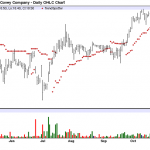The Amplify Snack Brands Story
Amplify Snack Brands (NYSE:BETR) came public in early August at $18/share but traded down from the start to reach the current $13-14 level. The company is generating very attractive margins from their flagship “Skinny Pop” ready-to-eat popcorn but many investors questioned the valuation. The short thesis can be summed up as “A $1B valuation for a small-cap popcorn company?!”

Amplify is going after the healthier, more expensive segment of the very large snack food market. In the view of management – they only need 1% market share to be a $4B company. They have two product lines: Skinny Pop popcorn and Paqui tortilla chips. Ready-to-eat popcorn seems like a commodity product but the name works and the product is definitely better than average based on our own tasting of a bag. A quick internet look-up confirms our favorable view for Skinny Pop (Amazon customers rated it 4.7/5 stars). Amplify aims to capitalize on the growing market trend of healthier eating and advocate healthy ingredients.
The growth strategy can be summed up as 1) add more points of sale, 2) broaden the Skinny Pop line with other flavors and different packaging and 3) acquire or launch new products. Based on the size and growth of the “better for you” segment of the snack food market the outcome of the investment story rests almost entirely on management execution. The other major question is how expansion will impact their rather high current operating margins.
The majority of the company is still owned by investment firm TA Associates. Public market investors often cast a wary eye on these private equity companies which are known for paying themselves first and doing a fair amount of financial engineering when selling shares back into public markets.
Our intrinsic valuation argues for a higher stock price though. Using fairly conservative assumptions (no margin expansion and a 15x multiple) we arrive at an IV of $23/share which would expand to $32/share a year from now if BETR management shows they are able to execute and they make the right acquisitions. (One caution to management here is that a bad M&A deal could sink the stock fairly easily if it suggests materially lower long-term margins.)












Leave A Comment